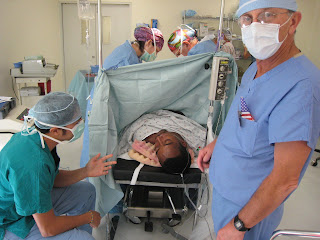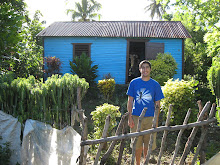Merry Christmas! What? It’s not Christmas today, you say? Well, it is here. Sort of. This is an unofficial tally, but I have gathered that Christmas runs from about December 1 to January 15, slightly more than the twelve days that we pretend that Christmas lasts in America (turtle doves?). These data figures come from indirect and direct observation, such as when my neighbor and the Brugal commercial tell me that “ya llegó la navidad.” Also, it has been raining here nonstop for over month, meaning that it is winter and thus Christmas. Rain, like magic, removes the average person from even remote responsibility for anything. Don’t leave your house: you might get wet. Given that the mode of transportation here is the motorcycle, this is likely. Still, a lost two months of productivity may make the economic situation here slightly more understandable. At least now it isn’t 100 degrees at noon and I only have to go to the buckets under the gutter to collect water, not to the river.
Back to Christmas. Sure, we all know that Christmas is December 25. They don’t even do that here. In the DR, the most important day is the 24th, which they call “noche buena,” or, good night. (To actually say “good night,” like to your roommate when you are going to bed, is “buenas noches.” Here, it is also used as a greeting when it is dark, like “good evening.”) The Good Night begins especially early, something around 9AM. By then, the pig is well on its way to being sufficienltly slaughtered and roasted on an open fire (something like chestnuts, but more hairy and with someone higher protein content). This means that it is time to drink, like most Dominican holidays (recall Corpus Christi day, Election Day, Patron Saint’s Day, etc.)
Why, then, does Christmas start the first of December? From the middle of November, I noticed a serious slowdown of work. By the beginning of this month, no one was showing up to meetings. Sure, some people still went to the pueblo to their jobs, but for those whose employment or other duties generally stay in the campo, its been over for awhile. It isn’t like anyone set a rule, or explicitly states that the meetings are cancelled, just no one shows. I noticed a general up tick in early and often attendance at the colmado for drinking/domino sessions.
Interestingly, most Dominicans receive “doble sueldo,” or double the salary, for December. This is akin to the holiday bonus, but is the rule rather than the exception. It has no basis in merit or accomplishments, it is just twice as much as is normally received. This means you can afford that pig to roast and the nifty bottle of white rum that fits in your pocket. Mmm. Warm.
Of course, New Years’ takes up a couple weeks, and then on January 6 falls Three Kings’ Day (look at all these fun things I learn about Catholicism being here), which is the day when presents are traditionally given, as opposed to Christmas itself. Then, at least another week or two is needed for some well-deserved recuperation after all those festivities. Soon enough, it is February, it has stopped raining, it is hot again, and Lent is upon us. The world begins to spin again.





